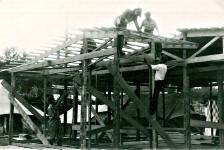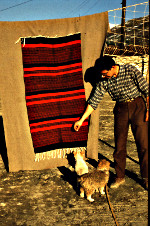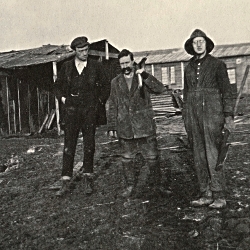Service Civil International
Spotlight on SCI History: SCI in Greece
by Heinz Gabathuler (Nov 11, 2013)
 This years' Internation Comittee Meeting of Service Civil International (SCI) will be held in Greece, remembering 30 years of uninterrupted SCI activity in the country.
This years' Internation Comittee Meeting of Service Civil International (SCI) will be held in Greece, remembering 30 years of uninterrupted SCI activity in the country.
The first SCI activists working in Greece, however, were representatives of the British IVSP who went there for doing relief and welfare work shortly after the liberation in 1944.

Hospital building after earthquake,
Argostóli (1954)
They were active in different parts of the country, from northern Thessalia down to the island of Crete. In 1948, after the Greek civil war between monarchists and communists had come to an end, SCI activists came back to help with the reconstruction of devastated villages. The projects were partly funded by UNESCO. The group was truly international, it included British, Swiss, French, US and Scandinavian, but at that time no Greek volunteers. They were confronted with a partly indifferent local population, uncertainties with funding, problems of bureaucracy and on top of that huge internal conflicts inside the group. Nevertheless some volunteers stayed for 2 years. In 1954, after an earthquake that concerned the Ionian islands, there was a new wave of international volunteering activity in Greece, this time with the participation of young students from Athens. In that context, first attempts were made to build up a local SCI group, but these attempts turned out to be unsuccessful.

Servia (1964)
From 1960 to 1964, the German and the Swiss branch of SCI were involved in a joint project with Christian (protestant) exchange organisations from Switzerland (Christlicher Friedensdienst, later YAP) and Germany (Aktion Sühnezeichen), doing community development work in the village of Servia in Greek Macedonia. The international team included a doctor, a nurse and a kindegarten teacher; besides the construction of houses, different welfare activities were an integral part of the concept. The focus of SCI work in the 1960s in Greece was no longer humanitarian relief but rather development work – with Greece still being considered a „developing country“. Political circumstances were difficult: Even though there was an active group of Greek volunteers who were enthusiastic about SCI's aims and visions, it was decided not to try to register them as the local branch of SCI but rather to keep them as partners of SCI, as SCI's International Constitution, speaking of Peace and mentioning Conscientious Objection would not have found the approval of the public authorities who followed a strictly anticommunist, militaristic and repressive approach. Such problems were at that time new to SCI, and there were controversial discussions about the approach to follow in Greece within the movement, mainly between the International Coordination, rather reluctant, on one and the Swiss Branch, more favourable to the support of the Greek friends on the other side. There were also serious doubts whether the local volunteers had enough capacities to run all the projects in Greece by themselves, without the help of permanent foreign representatives.
The military coup in 1967 and the following brutal repression of all independent civil society activities set an end to all SCI efforts undertaken in that period. It was only in 1983 that SCI returned to Greece which in the meantime had become a member of the European Community and was ruled by a Socialist government. The initiative was taken by the German branch who wanted to remind the Kalavryta massacre committed by the German army 40 years before. The exchange started with pilot workcamps, mutual study visits and eventually led to the creation of what is nowadays SCI Hellas.
- Sources: SCIIA 30801-30808
Â



